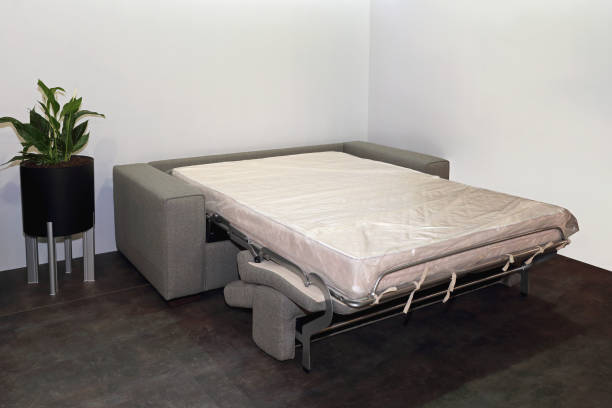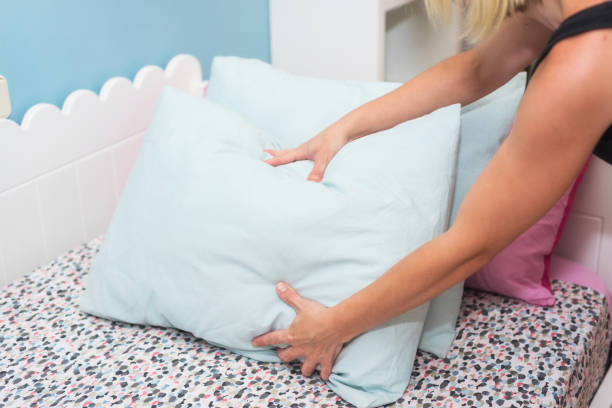Introduction

Sleep plays a crucial role in maintaining our overall well-being, and for individuals living with Parkinson's disease, a good night's rest becomes even more essential. The condition known as Parkinson's disease impacts the central nervous system and causes a range of symptoms that may or may not involve movement. Among these, sleep disturbances are a common and often disruptive disease feature.
As researchers delve deeper into understanding the complexities of Parkinson's, they have uncovered a fascinating correlation between bedding choices and the sleep health of those living with the condition. In this blog post, we explore the significant impact bedding choices can have on the quality of sleep experienced by individuals with Parkinson's disease, shedding light on a lesser-known aspect of managing their overall well-being.
How do bedding choices affect the sleep health of individuals with Parkinson's disease?
Regarding individuals with Parkinson's disease, bedding choices play a significant role in promoting good sleep health. People with Parkinson's disease may have difficulty getting enough sleep due to physical symptoms. Everyone needs to get quality sleep. Therefore, selecting quality bedding can help reduce some of the physical discomfort associated with Parkinson's, allowing people to get better and more restful sleep.
To ensure comfortable bedding for individuals with Parkinson's disease, it's crucial to consider the mattress's comfort level, size, and temperature regulation capabilities. The mattress should be chosen based on individual needs and comfort level; some people with Parkinson's prefer memory foam mattresses as they are more supportive and help reduce pressure points. To counter movement difficulties sometimes associated with memory foam, use friction-reducing sheets and sleepwear.
Additionally, temperature regulation is key to promoting good sleeping habits; bedding materials and sleepwear fabrics should be breathable. Look for fabrics that are moisture-wicking and quick drying to help keep the body dry and comfortable overnight. Lastly, size is important for individuals with Parkinson's disease; a mattress that fits properly should be chosen to ensure that the person is comfortable and able to move freely throughout the night.
Connection Between Bedding Choices and Parkinson's Sleep Health

People with Parkinson's disease often experience sleep problems, such as insomnia, frequent nighttime awakenings, and difficulty staying asleep. The wrong bedding choice can exacerbate these issues. Quality bedding choices can make a difference in improving sleep health for those living with Parkinson's disease.
Here are some connections between bedding choices and Parkinson's sleep health:
Material:
Select bedding materials that are comfortable and easy to move on. Look for bedding fabrics made of the smoothest fibres, have friction-reducing properties, and moisture-wicking, quick-dry features. Many synthetics offer these features and are advantageous over natural fibres that hold moisture and can be more difficult to move on. A mattress with the right amount of cushioning and support is also important.
Weight:
Weighted blankets can benefit Parkinson's patients with sleep issues, as the added pressure helps to relax and soothe the body, allowing for better rest. However, they can also make repositioning in bed more difficult – but a good combination to achieve easier moving AND improved relaxing is to use friction-reducing sheets and sleepwear. These allow turning in bed without having to raise against the weight of the blanket or other covers. To ensure a comfortable and supportive sleep, consider choosing covers that offer sufficient weight without feeling too heavy on the body.
Temperature Regulation:
To alleviate night sweats or hot flashes, consider using sheets and sleepwear designed to regulate temperature while sleeping. Such sheets can enhance your comfort by keeping you dry and cool throughout the night, facilitating a good night's sleep.
Noise Reduction:
Individuals with Parkinson's disease who are sensitive to noise should look for bedding that can reduce noise in the bedroom, as it is important for their comfort. Look for fabrics that absorb sound and provide a quieter sleeping environment.
Safety:
For Parkinson's patients prone to falls, finding bedding that helps reduce the risk of slips and falls is important. Look for sheets with non-slip edging that stay in place for falls protection.
Comfort:
To ensure restful sleep, opt for comfortable and supportive bedding. Check out customer reviews before purchasing to see what others are saying and to ensure they are functional and comfortable.
Maintenance:
When it comes to maintaining quality bedding for Parkinson's patients, the key is to keep it clean. Wash or change sheets regularly and spot-clean any spills as soon as possible. Vacuum your mattress and pillows several times a year to eliminate dust mites and other allergens that can cause sleep irritation. Additionally, rotate your mattress every six months to help it maintain its shape and support.
Keep bedding in a cool, dry place away from direct sunlight when storing it. Also, check labels for specific care instructions, as some materials may require special handling. Finally, if you have pets, use soft cloth covers on the mattress and pillows to protect them from shedding fur or other debris.
If you have Parkinson's disease, it's essential to select bedding that offers you comfort and support to ensure a good night's sleep. Quality sleep is crucial for good health. To ensure that, choosing the appropriate bedding and maintaining it regularly is important. Use these guidelines to help maintain your bedding's quality, ensuring you sleep well.
Can specific pillows provide better support and comfort for people with Parkinson's during sleep?

Yes, pillows are designed to provide better support and comfort for people with Parkinson's during sleep. These pillows are typically made of memory foam or a combination of polyester and cotton materials that offer great ergonomic support while remaining soft and comfortable. Mattresses often have extra features, including adjustable filling levels, anti-snore technology, and temperature control for a more comfortable sleeping experience.
By providing better support and comfort, these pillows can help people with Parkinson's get the restful sleep they need to stay healthy and energized throughout the day. Some pillows also come with a machine-washable cover for easy and frequent cleaning. In summary, getting the right pillow can help make a big difference in providing better sleep support and comfort for people with Parkinson's. Remembering that a pillow should be based on individual needs and preferences is important. Invest some time in finding an option that suits you well.
Can the wrong bedding choices worsen sleep problems and symptoms related to Parkinson's disease?
Yes, the wrong bedding choices can worsen sleep problems and symptoms related to Parkinson's disease. Poor sleep is a major problem for people with Parkinson's, as it increases the severity of symptoms such as tremors, rigidity, and difficulty walking. To have a restful sleep, selecting bedding that suits your specific requirements is important.
It can be helpful for those with Parkinson's to choose supportive mattresses, adjustable beds, and specifically designed pillows or mattress toppers. Supporting mattresses provide comfort and reduce pressure on key areas of the body while reducing pain at night, while adjustable beds can help alleviate symptoms of sleep apnea, acid reflux, and other conditions related to Parkinson's. Additionally, pillows or mattress toppers specifically designed to provide a stable support system for persons with Parkinson's can be beneficial in reducing pain and discomfort associated with the condition.
FAQ's
What kind of bed is best for Parkinson's?
The best kind of bed for Parkinson's is one that provides good support and comfort. Choose a supportive mattress with adjustable beds and specifically designed pillows or mattress toppers to provide the optimal sleeping environment. Additionally, rotate your mattress every six months to help it maintain its shape and support.
What sheets are good for Parkinson's patients?
Soft, breathable, and easy to move on sheets are best for people with Parkinson’s. Friction-reducing sheets and sleepwear have been designed to enhance bed mobility. Additionally, look for moisture-wicking breathable fabrics to help stay dry and comfortable from night sweats.
What helps Parkinson's patients sleep?
People with Parkinson's should focus on creating a comfortable and supportive sleeping environment. This includes choosing the right mattress, pillow, sheets, and covers for their needs. Additionally, ensuring the bedroom is dark and quiet can help reduce distractions and encourage quality sleep. Lastly, avoiding caffeine or exercising late in the evening can also be beneficial in helping people with Parkinson's get better sleep.
Do weighted blankets help with Parkinson's disease?
People with Parkinson's may find that weighted blankets can promote relaxation and reduce anxiety. The additional weight helps stimulate the production of serotonin and melatonin, necessary hormones for quality sleep. Additionally, weighted blankets help reduce pain and discomfort associated with the condition. However, it's important to ensure the blanket isn't too heavy, which could cause increased discomfort. By using mobility-enhancing, friction-reducing sheets and sleepwear, it can be much easier to move under weighted covers because sitting up to change positions in no longer necessary. This is due to the friction being minimized through design factors. Talking with an expert or doctor about the best weight for your particular needs is important.
What worsens Parkinson's disease?
Poor sleep can worsen the symptoms of Parkinson's disease, as it increases the severity of existing symptoms such as tremors, rigidity, and difficulty walking. Stress can also worsen symptoms of Parkinson's, as it amplifies physical issues like tremor intensity and rigidity. Consulting with your doctor regarding the medications you are taking and their potential side effects is crucial, as some medications can aggravate the symptoms of Parkinson's disease.
What foods are high in dopamine for Parkinson's disease?
Foods that are high in dopamine can help reduce the symptoms of Parkinson's disease. These include bananas, avocados, soybeans, spinach, watermelon, and nuts. Additionally, some studies suggest that taking supplements containing tyrosine or l-dopa may be beneficial for people with Parkinson's
Conclusion
I hope that you have gained more insight into how choosing to bed can affect sleep health for individuals with Parkinson's disease through reading this article. Improving the sleeping environment to be comfortable and supportive can positively impact the quality of sleep and the overall health of those with Parkinson's. Additionally, incorporating foods high in dopamine into your diet and avoiding stress may also be beneficial in helping reduce symptoms of Parkinson's. If you have questions or concerns about bedding choices and sleep health, you should ask an expert or doctor for personalized advice. People with Parkinson's can lead healthier lives with access to accurate information and adequate support.

